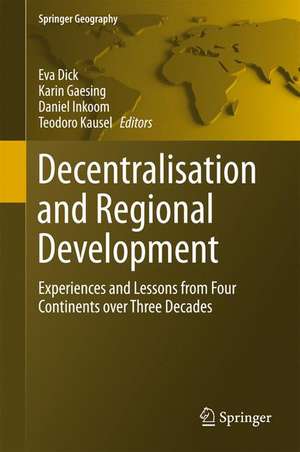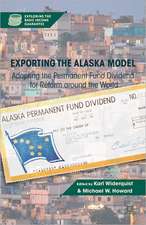Decentralisation and Regional Development: Experiences and Lessons from Four Continents over Three Decades: Springer Geography
Editat de Eva Dick, Karin Gaesing, Daniel Inkoom, Teodoro Kauselen Limba Engleză Hardback – 23 iun 2016
| Toate formatele și edițiile | Preț | Express |
|---|---|---|
| Paperback (1) | 636.63 lei 6-8 săpt. | |
| Springer International Publishing – 31 mai 2018 | 636.63 lei 6-8 săpt. | |
| Hardback (1) | 564.52 lei 38-45 zile | |
| Springer International Publishing – 23 iun 2016 | 564.52 lei 38-45 zile |
Din seria Springer Geography
- 18%
 Preț: 961.55 lei
Preț: 961.55 lei - 15%
 Preț: 665.01 lei
Preț: 665.01 lei - 18%
 Preț: 792.72 lei
Preț: 792.72 lei - 20%
 Preț: 564.78 lei
Preț: 564.78 lei - 15%
 Preț: 533.88 lei
Preț: 533.88 lei - 18%
 Preț: 1224.36 lei
Preț: 1224.36 lei - 18%
 Preț: 949.73 lei
Preț: 949.73 lei - 18%
 Preț: 1115.46 lei
Preț: 1115.46 lei - 18%
 Preț: 1115.46 lei
Preț: 1115.46 lei - 18%
 Preț: 730.35 lei
Preț: 730.35 lei -
 Preț: 441.37 lei
Preț: 441.37 lei - 18%
 Preț: 1004.19 lei
Preț: 1004.19 lei - 18%
 Preț: 949.55 lei
Preț: 949.55 lei - 15%
 Preț: 644.30 lei
Preț: 644.30 lei -
 Preț: 398.74 lei
Preț: 398.74 lei - 18%
 Preț: 955.25 lei
Preț: 955.25 lei - 18%
 Preț: 787.15 lei
Preț: 787.15 lei - 18%
 Preț: 1003.38 lei
Preț: 1003.38 lei - 18%
 Preț: 897.14 lei
Preț: 897.14 lei - 18%
 Preț: 1117.03 lei
Preț: 1117.03 lei - 18%
 Preț: 1120.18 lei
Preț: 1120.18 lei - 18%
 Preț: 1128.08 lei
Preț: 1128.08 lei - 18%
 Preț: 726.37 lei
Preț: 726.37 lei - 18%
 Preț: 964.54 lei
Preț: 964.54 lei - 15%
 Preț: 647.40 lei
Preț: 647.40 lei - 15%
 Preț: 646.62 lei
Preț: 646.62 lei - 15%
 Preț: 640.71 lei
Preț: 640.71 lei - 18%
 Preț: 2154.04 lei
Preț: 2154.04 lei - 15%
 Preț: 648.05 lei
Preț: 648.05 lei - 24%
 Preț: 1118.09 lei
Preț: 1118.09 lei -
 Preț: 391.61 lei
Preț: 391.61 lei - 18%
 Preț: 961.55 lei
Preț: 961.55 lei - 18%
 Preț: 948.16 lei
Preț: 948.16 lei - 18%
 Preț: 1563.24 lei
Preț: 1563.24 lei - 15%
 Preț: 647.27 lei
Preț: 647.27 lei - 24%
 Preț: 857.93 lei
Preț: 857.93 lei - 24%
 Preț: 1139.71 lei
Preț: 1139.71 lei - 5%
 Preț: 1116.73 lei
Preț: 1116.73 lei - 20%
 Preț: 551.32 lei
Preț: 551.32 lei - 15%
 Preț: 637.13 lei
Preț: 637.13 lei - 15%
 Preț: 642.03 lei
Preț: 642.03 lei - 18%
 Preț: 940.39 lei
Preț: 940.39 lei -
 Preț: 395.09 lei
Preț: 395.09 lei -
 Preț: 365.45 lei
Preț: 365.45 lei - 18%
 Preț: 960.13 lei
Preț: 960.13 lei - 24%
 Preț: 643.01 lei
Preț: 643.01 lei
Preț: 564.52 lei
Preț vechi: 705.65 lei
-20% Nou
Puncte Express: 847
Preț estimativ în valută:
108.02€ • 115.51$ • 90.07£
108.02€ • 115.51$ • 90.07£
Carte tipărită la comandă
Livrare economică 14-21 aprilie
Preluare comenzi: 021 569.72.76
Specificații
ISBN-13: 9783319293653
ISBN-10: 3319293656
Pagini: 250
Ilustrații: XXX, 185 p. 26 illus., 15 illus. in color.
Dimensiuni: 155 x 235 x 14 mm
Greutate: 0.48 kg
Ediția:1st ed. 2016
Editura: Springer International Publishing
Colecția Springer
Seria Springer Geography
Locul publicării:Cham, Switzerland
ISBN-10: 3319293656
Pagini: 250
Ilustrații: XXX, 185 p. 26 illus., 15 illus. in color.
Dimensiuni: 155 x 235 x 14 mm
Greutate: 0.48 kg
Ediția:1st ed. 2016
Editura: Springer International Publishing
Colecția Springer
Seria Springer Geography
Locul publicării:Cham, Switzerland
Cuprins
Editorial.- Preface.- Theoretical reflections on Ghana's decentralisation: Increasing discretional funding through the District Development Facility.- Decentralisation and local economic development promotion at the district level in Ghana.- Levelling the gradients – planning for equivalent standards of living, the German experience.- Decentralisation in the German context: An assessment of governance actors and approaches from below.- Decentralisation and urban governance: Trends and lessons from cities in Tanzania.- Decentralisation of municipal servicing in Tanzania: Opportunities and challenges.- Analysis and lessons from decentralisation and its implications to local environmental planning and management in the Philippines.- Assessing the effectiveness of the decentralisation policy on disaster risk reduction and management: The case of Hagonoy, Bulacan, Philippines.- Smarter money for smarter cities: How regional currencies can help to promote a decentralised and sustainable regional development.
Textul de pe ultima copertă
This book analyzes decentralisation, regionaldevelopment paths and success factors in different governance sectors in Ghana,the Philippines, Tanzania and Chile, and discuss overarching aspects ofrelevance. Decentralisation, which refers to the delegation of administrativeresponsibilities, political decision-making and fiscal powers to lower levelsof government, is now considered one of the most efficient engines ofdevelopment. In Sub-Saharan Africa decentralised states have made more progressin reducing poverty than those states with lower decentralisation scores. Butin many countries, decentralisation is still considered a ‘work in progress’with unsatisfactory results. From a spatial point of view, the link betweendecentralisation and regional and district development is particularlyinteresting. Both in the North and in the South, regional or district developmentis seen as holding the potential for advancing social and economic development,and even more so in decentralised political settings. Space-based networks atthe regional or district level are considered instrumental for responding tolocally specific challenges, e.g. in areas lagging behind economically.
Caracteristici
Analyzes decentralisation and regional development in four different world regions making a novel contribution to comparative studies in the field Blends theoretical and empirical perspectives that illustrate to researchers and students why and how similar concepts may materialize unequally in different contexts Combines matters of analysis with policy-related considerations to benefit both practitioners and policy makers in the respective countries Builds the link between decentralisation and regional , "soft spaces" development is innovative in spatial sciences, which have hitherto more focused on local institutional and resource settings Includes supplementary material: sn.pub/extras
















